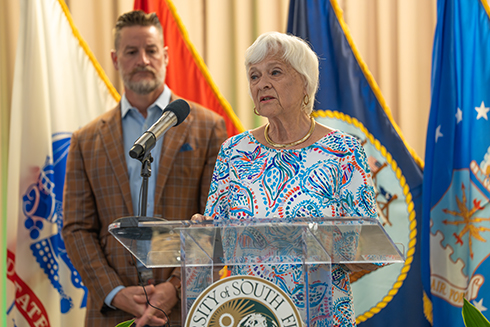USF, Congressman Greg Steube announce new cybersecurity training program

University Communications and Marketing
The University of South Florida on Friday announced the launch of a new program focusing
on information security governance, risk and compliance, an online professional education
offering designed to meet the critical shortage of cybersecurity professionals.
Dubbed the InfoSec GRC Analyst program, the four-module training will be offered free
of charge for up to 250 people, with priority enrollment given to those who are veterans/military,
first-responders and other governmental roles. The goal is to equip participants with
essential skills to navigate cybersecurity challenges.
Applications for the program opened Friday. Selected participants can access lessons
starting July 8 and must complete it within 60 days of the date they access the content.
Priority enrollment will be extended to entry-level and transitioning professionals
serving within local and regional governmental organizations. The non-credit program
is open to the public and participants will earn a USF Certification via a digital
micro credential. They can use the skills developed to advance in their careers and
contribute to national security efforts.
The USF InfoSec GRC Analyst program will teach participants how to navigate complex
compliance challenges, focusing first on the foundations of information security before
moving into modules that focus on how to implement and assess organizations against
trusted frameworks and industry standards. By the end of the program, participants
will be able to advise organizations on ways to implement security controls that can
reduce cyber risks.
U.S. Rep. Greg Steube, R-Sarasota, and Karen Holbrook, Sarasota-Manatee campus regional
chancellor announced the program during an event at USF Sarasota-Manatee.
Steube provided critical support for the program, securing a $2 million appropriation
from Congress. The congressman envisioned a top-shelf training that could fortify
governmental organizations against evolving threats utilizing the experience of veterans
and turned to USF’s Corporate Training and Professional Education team to develop
the program.
“As cybersecurity threats become more prevalent and sophisticated, the need for professionals
who are trained in reducing cyber risks continues to grow,” said USF President Rhea
Law. “The University of South Florida’s expertise and partnerships in the business
community make us uniquely positioned to help address this need, and we are proud
to offer this innovative certificate program for those who are looking to upskill
and advance in their careers.
“We are grateful to U.S. Rep. Greg Steube for his leadership in helping secure the
funding to create this program and for his continued support of USF, military veterans
and first responders,” Law said.
Steube said there are almost 30,000 unfilled cybersecurity jobs in Florida, “representing
an in-demand field with great job security into the future.
“It’s an honor to be part of connecting military veterans and others who have served
our community with this new opportunity. I’m thankful to the USF leadership for their
foresight and careful planning to execute this new program,” Steube said. “As your
representative, it’s my duty to ensure we can bring as many of your federal taxpayer
dollars back to the 17th Congressional District as possible, and this project will
certainly make a difference for many Floridians and our workforce in southwest Florida.”
Holbrook, who said USF has a strong record of supporting military veterans, noted
that the university has announced its intent to open a new college focused on cybersecurity
and artificial intelligence.
“At USF, we relentlessly pursue innovation,” she said.
Sarasota Police Chief Rex Troche and representatives attended Friday’s announcement.
“This is going to help our veterans be more successful in the workforce,” said Kendra
Simpkins, a USF Sarasota-Manatee alum, U.S. Army veteran and co-founder and president
of Operation Warrior Resolution.
Leaders from CBIZ, including Elzar Camper, the firm’s managing director in its risk
and cybersecurity practice area, are serving as instructors in modules that focus
on technology, policy, procedures and industry frameworks. Other instructors include
Warren Hylton, a senior associate at CBIZ Pivot Point Security, and Jeff Carden, from
the firm’s federal risk and compliance team. They partnered with the award-winning
learning designers from USF’s Innovative Education unit to design this program based
on their “real world” expertise and experience.
The program includes three asynchronous modules, where participants study on their
own time:
- Module 1: covers information security fundamentals needed for later modules that focus
on identifying threats and vulnerabilities. The module case study focuses on how assessment
methods can be operationalized. - Module 2: focuses on ways that governance, risk, and compliance actions either work
towards better information security or work against information security. - Module 3: dives into information security assessments, remediation planning, and reporting,
giving participants the skills needed to prepare an assessment. - Module 4: In the only synchronous segment, the final module guides participants as
they synthesize what they’ve learned by participating in an authentic audit scenario
and producing a final report thus demonstrating their newly acquired skills.
CBIZ instructors will provide feedback on quizzes, assignments and will grade and
critique of the final project. Monthly office hours sessions and coaching opportunities
ensure ongoing support for participants throughout the course.
“By offering a mostly self-paced, yet supported, learning experience, we aim to empower
individuals from various backgrounds to pursue rewarding careers in cybersecurity,”
said Mark Koulianos, assistant vice president for university-community partnerships
and the leader of the Corporate Training and Professional Education team.
In addition to comprehensive coursework, USF aims to host in-person networking meetups
twice a year, providing opportunities for learners to connect with industry professionals
and expand their professional networks.
For more information and to apply for the program, visit usf.to/InfoSecGRC



